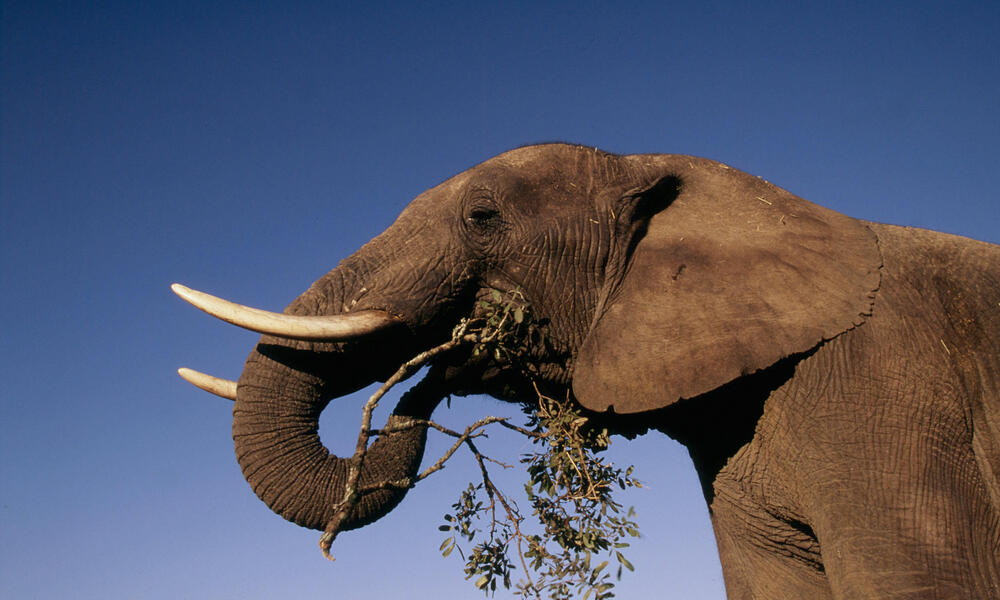
African elephants are the majestic giants of Tanzania’s wilderness, often seen in iconic parks like Tarangire and Serengeti. Revered for their intelligence, social complexity, and sheer grandeur, elephants embody the spirit and beauty of Tanzania’s diverse landscapes. In this blog post, we delve into the captivating world of African elephants in Tanzania, exploring their behaviors, habitats, conservation efforts, and tips to ensure your safari is filled with unforgettable encounters with these majestic giants.

Meet the African Elephant: Nature’s Gentle Giants
The African elephant (Loxodonta africana) is the largest land mammal on Earth, renowned for its impressive size, distinctive features, and profound presence in the wild. These gentle giants are not only a symbol of strength and wisdom but also play a crucial role in maintaining the health of their ecosystems.
Distinctive Appearance: African elephants are easily recognizable by their massive bodies, large ears that help regulate body temperature, and long trunks, which are versatile tools for feeding, drinking, and social interactions. Both males and females possess tusks, though they are generally larger and more pronounced in males.
Intelligence and Memory: Elephants are highly intelligent animals with remarkable memory and problem-solving abilities. Their complex social structures and emotional depth make them fascinating subjects of study and admiration.
Habitat and Distribution in Tanzania
African elephants thrive in a variety of habitats across Tanzania’s rich and diverse landscapes, each offering unique environments that support their needs.
Serengeti National Park: Home to one of the largest elephant populations in Africa, the Serengeti’s vast savannahs and abundant water sources provide ideal conditions for elephants to roam freely and interact within their herds.
Tarangire National Park: Known for its large baobab trees and sprawling grasslands, Tarangire offers ample grazing opportunities and a thriving ecosystem that supports healthy elephant populations.
Ruaha National Park: As Tanzania’s largest national park, Ruaha provides expansive territories and diverse habitats, from open plains to dense woodlands, ensuring elephants have ample space to live and migrate.
Behavior and Social Structure
African elephants are highly social animals, living in complex matriarchal herds that showcase their strong familial bonds and cooperative behaviors.
Matriarchal Herds: A typical elephant herd is led by the oldest and most experienced female, the matriarch. This matriarch guides the herd in finding food, water, and safe migration routes, drawing on her extensive knowledge and memory.
Social Bonds: Elephants maintain strong social bonds within the herd, engaging in behaviors such as touching trunks, vocalizing, and playful interactions. These bonds are essential for the herd’s cohesion and survival.
Communication: Elephants communicate through a variety of sounds, including trumpets, rumbles, and infrasound (low-frequency sounds that travel long distances). These communications help coordinate group movements and convey emotions.
Diet and Feeding Habits
African elephants are herbivores with a diverse and substantial diet that sustains their massive bodies and supports their ecosystem.
Grazers and Browsers: Elephants consume a wide variety of vegetation, including grasses, leaves, bark, fruits, and twigs. Their diet varies with the seasons, adapting to the availability of different food sources.
Water Consumption: Elephants require significant amounts of water daily. They use their trunks to suck up water and spray it into their mouths for drinking or onto their bodies for cooling and bathing.
Ecological Impact: By feeding on vegetation, elephants help maintain the balance of their habitats, promoting plant diversity and preventing overgrowth. Their movement patterns also create pathways that benefit other wildlife.
Conservation Status and Efforts
African elephants in Tanzania face numerous challenges that threaten their populations, making conservation efforts crucial for their survival.
Threats: Habitat loss due to agricultural expansion, human-elephant conflict, and poaching for ivory and meat are significant threats to elephant populations. Additionally, diseases and climate change further exacerbate their vulnerability.
Conservation Initiatives: Tanzania is committed to elephant conservation through various initiatives, including anti-poaching patrols, community-based conservation programs, and the establishment of protected areas. National parks like Serengeti, Tarangire, and Ruaha play a pivotal role in providing safe havens for elephants to thrive.
Community Engagement: Involving local communities in conservation efforts fosters coexistence and reduces conflicts. Educational programs and sustainable livelihood projects help garner support for elephant protection and promote responsible tourism.
Tips for Spotting Elephants on Safari
Enhance your elephant-watching experience with these practical tips:
Choose the Right Parks: Serengeti, Tarangire, and Ruaha National Parks are prime locations for spotting large herds of elephants, thanks to their suitable habitats and abundant resources.
Optimal Timing: Early morning and late afternoon game drives are the best times to see elephants when they are most active, grazing, and socializing.
Guided Tours: Experienced safari guides have the expertise to track and locate elephants, increasing your chances of witnessing these majestic animals in action.
Stay Patient and Observant: Elephants can be found near water sources, feeding areas, and travel routes. Patience and keen observation are key to spotting their movements and behaviors.
Experience the Majesty of Elephants with Future African Safari
Encountering African elephants on your Tanzanian safari is a profound and unforgettable experience that connects you with the heart of Africa’s wild heritage. At Future African Safari, we are dedicated to providing exceptional safari experiences that bring you up close with Tanzania’s magnificent elephants while supporting vital conservation efforts. Our expert guides, personalized itineraries, and commitment to sustainable tourism ensure that your adventure is both thrilling and meaningful.
Ready to walk alongside Tanzania’s majestic elephants? Contact Future African Safari today to customize your Tanzanian safari and embark on a journey that celebrates the power, grace, and beauty of Africa’s largest land mammals.
Explore more about our safari packages and discover the best of Tanzania with Future African Safari. Your unforgettable African adventure starts here!

